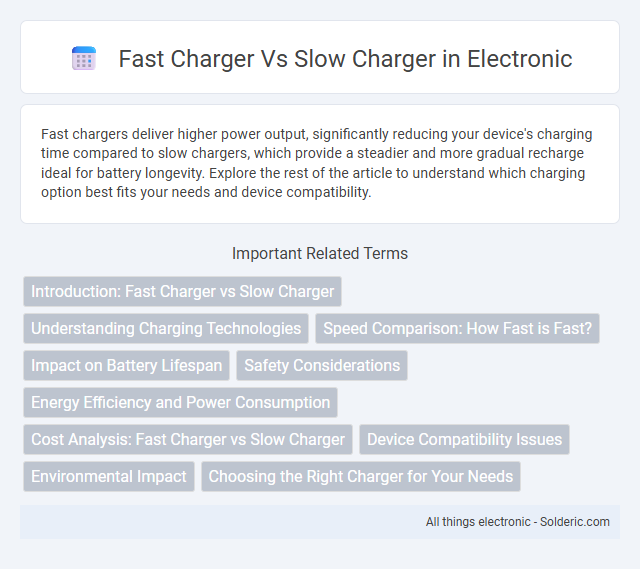Fast chargers deliver higher power output, significantly reducing your device's charging time compared to slow chargers, which provide a steadier and more gradual recharge ideal for battery longevity. Explore the rest of the article to understand which charging option best fits your needs and device compatibility.
Comparison Table
| Feature | Fast Charger | Slow Charger |
|---|---|---|
| Charging Speed | High (typically 50W to 120W+) | Low (typically 5W to 15W) |
| Charging Time | 30 minutes to 1 hour (for full charge) | 2 to 5 hours (for full charge) |
| Heat Generation | Higher heat, may require cooling | Lower heat, minimal cooling needed |
| Battery Impact | Potential faster battery degradation if used excessively | Gentler on battery, extends battery lifespan |
| Cost | More expensive chargers and cables | Generally affordable and widely available |
| Use Case | Ideal for quick top-up and emergency charging | Best for overnight and regular charging |
Introduction: Fast Charger vs Slow Charger
Fast chargers deliver high power output, significantly reducing EV charging time by supplying current levels from 50 kW to over 350 kW, compared to slow chargers that typically provide 3.7 kW to 7.4 kW suitable for overnight charging. The rapid energy transfer in fast chargers requires advanced cooling systems and higher voltage compatibility, making them ideal for long-distance travel and public charging stations. Slow chargers offer cost-effective installation and minimal impact on battery longevity, making them preferable for home use and routine daily charging needs.
Understanding Charging Technologies
Fast chargers utilize higher voltage and current to rapidly replenish electric vehicle batteries, significantly reducing charging time compared to slow chargers, which operate at lower power levels for gradual energy transfer. The advanced technology in fast chargers includes DC fast charging and high-power AC charging that optimize battery management systems to ensure safety and efficiency. In contrast, slow chargers typically rely on standard AC power sources, making them suitable for overnight or extended charging sessions where speed is less critical.
Speed Comparison: How Fast is Fast?
Fast chargers deliver power at rates of 50 kW or higher, enabling electric vehicles (EVs) to recharge up to 80% capacity in 20-40 minutes, compared to slow chargers that typically provide 3-7 kW and require 6-12 hours for a full charge. The higher current and voltage in fast chargers significantly reduce charging time, making them ideal for quick top-ups during long trips or busy schedules. Slow chargers are more suited for overnight charging and locations with limited electrical infrastructure due to their lower power output and longer charging times.
Impact on Battery Lifespan
Fast chargers deliver higher voltage and current, which can raise battery temperature and accelerate chemical degradation, potentially reducing battery lifespan over time. Slow chargers provide a gentler charging rate, minimizing heat buildup and stress on battery cells, thus preserving battery health and extending its overall service life. Choosing the right charger impacts your device's longevity by balancing charging speed and battery durability.
Safety Considerations
Fast chargers generate higher levels of heat and stress on battery cells, increasing the risk of overheating or damage if not equipped with advanced safety features like temperature control and overcurrent protection. Slow chargers operate at lower power levels, reducing the likelihood of thermal runaway and ensuring a gentler charge cycle, which prolongs battery lifespan. Ensuring your charger complies with safety standards and includes built-in protection mechanisms is essential for preventing hazards during both fast and slow charging.
Energy Efficiency and Power Consumption
Fast chargers deliver higher power output, resulting in quicker charging times but increased energy consumption due to heat dissipation and reduced efficiency at higher voltages. Slow chargers operate at lower power levels, offering better energy efficiency by minimizing heat loss and maintaining stable voltage throughout the charging cycle. Comparing both, slow chargers conserve more energy during extended charging periods, while fast chargers prioritize speed at the cost of slightly higher power consumption.
Cost Analysis: Fast Charger vs Slow Charger
Fast chargers typically have higher upfront costs, ranging from $400 to $2,000, while slow chargers cost between $200 and $500. Operating expenses for fast chargers may be higher due to increased electricity demand charges and potential battery degradation, impacting long-term savings. Slow chargers, with lower installation and maintenance costs, offer a cost-effective option for overnight charging and extend battery lifespan, optimizing overall vehicle expenses.
Device Compatibility Issues
Fast chargers often face device compatibility issues due to varying power delivery standards like Qualcomm Quick Charge or USB Power Delivery, which may not be supported by all devices. Slow chargers, typically providing consistent lower wattage, tend to have broader compatibility across older or less advanced devices. Using a fast charger with an incompatible device can lead to reduced charging speed or potential battery damage, making it essential to verify device support before use.
Environmental Impact
Fast chargers consume more electricity in a shorter time, leading to higher instantaneous energy demand, which can strain power grids and increase reliance on non-renewable sources during peak periods. Slow chargers promote energy efficiency by distributing electricity use over longer durations, reducing carbon emissions associated with rapid power draw. Choosing slow chargers supports grid stability and reduces the overall environmental footprint of electric vehicle charging.
Choosing the Right Charger for Your Needs
Fast chargers deliver higher wattage, significantly reducing charging time for devices such as smartphones and laptops, making them ideal for users needing quick power boosts. Slow chargers use lower wattage, providing a gentler charge that helps preserve battery health and longevity, suitable for overnight charging or devices with smaller batteries. Selecting the right charger depends on balancing the urgency of charging speed with the priority of maintaining battery lifespan.
fast charger vs slow charger Infographic

 solderic.com
solderic.com